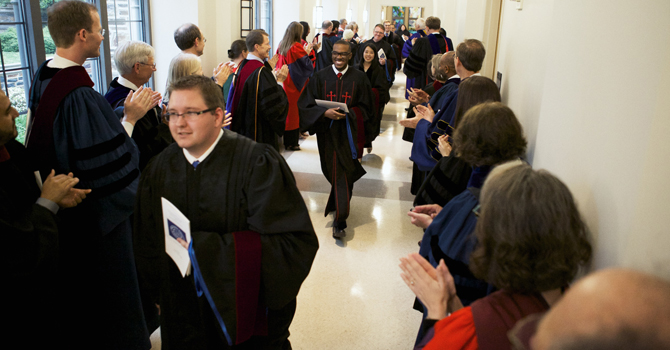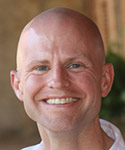For most of the 40 of us, it was our first exam in seminary. There had been papers, certainly, quizzes too, but on that surprisingly steamy October morning, we took our seats to spend two hours demonstrating our mastery of the nuances of the first four centuries of church history.
Our professor, an ascetic Roman Catholic laywoman who taught with a mystical zeal for her subject, entered the classroom and walked to the front holding a manila envelope. She smiled a knowing, loving smile.
“Beloved, take your rest in your calling,” she said before distributing the exams. “The God who brought you here will see you through.”
It was a simple blessing -- and one I have thought about, preached about and prayed about in the 15 years since.
“Beloved, take your rest in your calling.”
That is no easy thing to do in a classroom during an exam. It is no easier across a lifetime spent in a vocation.
As Parker Palmer has poignantly observed, the demands, pressures and struggles of professional life can -- and often do -- estrange us from a sense of calling. Whether we are teachers or clergy, lawyers or physicians, journalists or architects, it is easy to find ourselves practicing a profession while becoming ever more disconnected from the reasons we pursued it in the first place.
This estrangement from calling often begins early in our professional lives.
In 2010, Muhammad Yunus, the founder of the Grameen Bank, was the commencement speaker at Duke University. His speech contained all the laudatory phrases that those kinds of occasions demand, culminating with a charge to the graduates that they must go forth to change the world.
A few weeks later, I called a friend, one of the many graduates that day who had heard Yunus’ speech. He asked me to hold on; he had to change his newborn’s diaper.
New and young professionals often go into their professions in hopes of changing the world. More often than not, in the first years of their professional lives they feel like they are just changing diapers.
The work they wanted for themselves is not the work they find themselves doing. Their days are consumed by the mundane or the tedious. They expend tremendous energy with little to show for it. They are overwhelmed in battles against yesterday’s prejudices or underwhelmed by petty squabbles and meaningless changes.
The contrasts in their lives become a nagging question: “Is this all there is?”
I hear this question again and again. Too often, when new or young professionals have found the courage to give voice to a nascent inner ache, they tell me that their longer-tenured colleagues have dismissed them, saying, “Changing diapers is a way of changing the world” (or the equivalent).
Though this is undoubtedly true, it is the same kind of weak consolation offered clumsily to grieving families. It fails to honor the honest pain of the other’s experience, rushing to resolve tensions that can really only be held.
As for many colleges, universities, seminaries and other professional schools, Mother’s Day weekend was graduation weekend for Duke Divinity School. There are now many more masters of divinity and masters of theology, doctors of philosophy and doctors of theology. The graduates I know are bright-eyed and eager, capable and brilliant, loving and good. They love the church and are committed to its future.
They are beginning their professional ministries at a precarious time. Trust in clergy and in the church is at its lowest point since pollsters started asking the question. Even in regions of the country still predisposed to trust the church and its ministers, most churches are smaller today than they were even a decade ago, and more financially imperiled. Sadly, when the church gets leaner, it often also gets meaner.
To be honest with these new graduates, we probably should have read over them Jesus’ warning: “I am sending you out as sheep among wolves.”
For them and for all of us, we need to find new ways of being in relationship as professionals. Here, I am not envisioning more mandatory meetings facilitated by those with formal authority. I am envisioning the development of authentic communities where new and long-tenured professionals can voice our vocational hopes and name the places of dis-ease in our professional practice.
These communities do develop, often when we cross institutional, denominational and geographic borders.
In learning communities such as Foundations of Christian Leadership, in retreat-based programs such as Circles of Trust, in regularly meeting peer groups, we can express the real narratives of our callings, not the well-rehearsed stories we offer to credentialing boards and ordination committees.
In these spaces, we can hold the tensions between our vocations as we imagined them and the realities of how we live them. We can give each other time to take our rest in our calling.
It’s been 15 years since my professor offered that blessing, and I can still see her smile over us as she did.








